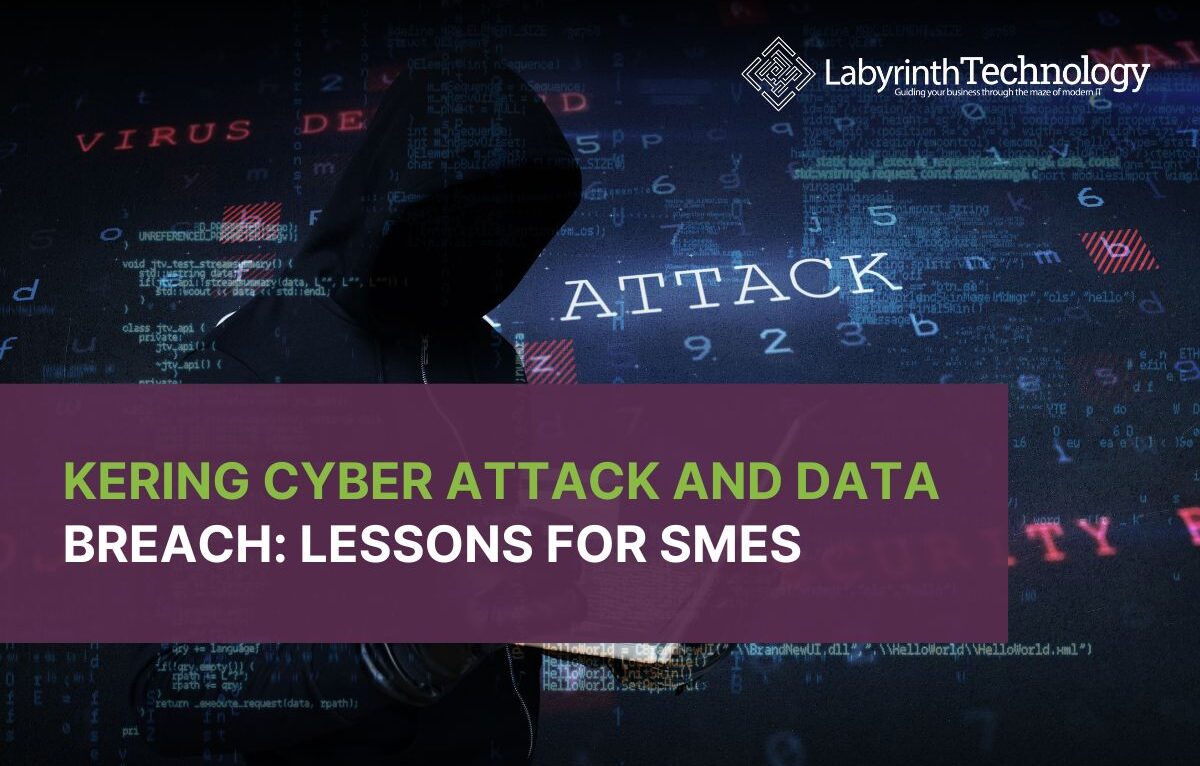
Kering Cyber Attack and Data Breach: In June 2025, luxury group Kering confirmed a cyber attack that exposed limited customer data, including names, contact details, and purchase amounts. The incident, claimed by hacker group ShinyHunters, reportedly affected over 7 million email addresses. While no payment data was taken, the breach highlights how personal information can fuel phishing and fraud. For SMEs, the lesson is clear: strong backups, multi-factor authentication (MFA), regular patching, staff training, and clear incident response plans are essential for resilience.

Kering, the parent company of brands like Gucci, Balenciaga, and Alexander McQueen, confirmed it had suffered a cyber incident. Attackers gained unauthorised access to customer information. Kering said no financial data was involved, but names, emails, phone numbers, postal addresses, and total spend amounts were affected.
Hacking group ShinyHunters claimed responsibility. They told reporters the breach involved 7.4 million email addresses, although Kering has not confirmed the number. By September, media outlets were reporting on leaked samples, showing how far the data had spread.
The key point is this: the damage didn’t require stolen credit cards. Contact details and spend profiles alone are enough for cybercriminals to launch convincing phishing campaigns.
It is tempting to think of data breaches as a problem for “the IT team.” The Kering Cyber Attack and Data Breach shows that’s not true. Once sensitive information is exposed, the impact runs through the entire business.
Customers lose trust. High-value clients may be targeted with tailored scams. Regulators take an interest. Reputational damage lingers.
For SMEs, the same principle applies. If your customer list is exposed, attackers will use it to send phishing emails, impersonate your brand, and exploit your reputation. A breach is not just about data, it is about your operations, your sales, and your future growth.

The Kering case highlights simple but powerful lessons that SMEs can act on today.
Keep tested backups of critical systems. Store at least one offline, beyond the reach of ransomware. Test restores often. A backup is only useful if it works when you need it.
MFA is essential. It makes stolen passwords far less useful. Review admin accounts and cut down access where possible. The fewer privileged accounts you have, the smaller your risk surface.
Attackers often exploit weaknesses that already have a fix. Apply updates for your operating systems, applications, and security tools. Regular patching is one of the cheapest and most effective defences you can deploy.
Prevention is never perfect. Tools like endpoint detection can help you spot suspicious behaviour before it spreads. Even basic monitoring of logins, email forwarding, or unusual file access can give you early warning.
In the Kering incident, leaked contact details could be used for phishing. Staff need to recognise suspicious messages, fake invoices, or refund requests. With training, your people go from being a risk to being part of your defence.
When something goes wrong, clarity saves time. Write down who shuts down systems, who informs staff and customers, and who deals with regulators. A short, practical incident response plan helps you recover faster and with less confusion.

The Kering Cyber Attack and Data Breach proves that a breach doesn’t need to involve stolen credit cards to be costly. Exposure of personal data creates reputational damage, legal obligations, and targeted fraud risks.
For SMEs, the stakes are just as high. Ask yourself: if your client database leaked, how would you explain it to customers? Could you still trade confidently while dealing with regulatory investigations or public questions?
Cyber incidents don’t just hit IT. They hit your ability to operate.
You might think criminals only bother with global brands like Kering. In reality, small and medium-sized businesses are often easier prey. You may not have an internal security team. You may not patch every system on time. That makes you an attractive target.
Hackers look for weak links, not big names. If your defences are thin, you’re on their radar.

At Labyrinth, we work with SMEs across London to build resilience against exactly these risks. Our role is to make cyber security practical, not complicated.
We help you put the basics in place: strong MFA, regular patching, secure backups, and clear incident response plans. We also support your people with training, so phishing emails and social engineering attempts don’t catch them out.
Because even with best practice, incidents can still happen, we guide you in setting up monitoring and recovery that fits your budget. That way, if you do face a breach or ransomware attack, you can get back on your feet quickly.
Cyber security isn’t about endless tools or big spending. It is about making sure your business can keep running when things go wrong. That’s where we step in.
The Kering Cyber Attack and Data Breach is a warning to businesses everywhere. It shows that cyber incidents are not just about stolen data, they are about continuity, resilience, and reputation.
By acting now with tested backups, enforced MFA, regular patching, real monitoring, staff training, and a written response plan, you protect more than just information. You protect your ability to serve customers, pay staff, and grow your business.
At Labyrinth Technology, we help SMEs build that resilience. Don’t wait for an attack to expose the gaps in your defences. Get in touch today.
Empowering London Businesses with Efficient IT Solutions to Save Time and Stay Ahead of the Competition.